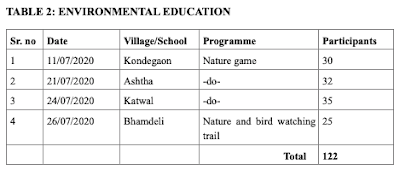Highlights:
THE FULL REPORT
Team:
Conservation Officer: Ajay Poddar
Field Assistant: Kishor Dudhbarai
Highlights of the month:
- 3 check dams constructed – 22 young villagers participated
- 2 garbage management programs to prevent human- animal conflict –75 villagers participated
- 2 foot patrols in buffer – 19 local young villagers participated
- 3 nature games - 62 children participated
- 3 women’s Self-Help Group (SHG) meetings were organised - 34 members attended
- 4 Village Eco Development Committee (VEDC) meetings - 46 members attended
- 3 Primary Response Teams (PRT) sensitisation meeting - 15 team members attended
- 4 livestock management meetings - 59 villagers attended
- Assisted 2 villagers to claim compensation for their cattle killed by carnivores
During the month, we constructed 3 check dams at different locations in the buffer area which will provide water to wildlife that often venture towards villages during dry weather spells. 22 villagers volunteered to construct the check dams.
We also organised foot patrols during the month. Our team consists of local young villagers, who have been supporting Satpuda Foundation and the Forest Department in forest and wildlife conservation activities. We organised patrols with our team at Khutwanda and Mudholi forest beats with forest and beat guards. During the patrol, our team observed a tiger’s (probably a sub-adult’s) pug mark around Mudholi beat and informed the range forest officer. Camera traps have been deployed by the Department after our information.
Environment Education: See Table 2
During September, we organised a students sensitisation drive through wildlife conservation awareness and environmental education programs in Mudholi and Bhamdeli villages. We engaged children in interactive nature game where they learned about identification of wildlife and importance of their conservation. 62 local children participated in the activities. Nature and birdwatching trails will be organised after the monsoon.
Employment Cell: See Table 3
Due to the current lockdown situation, most of the forest dwelling communities are going through hardship. Members of women’s SHGs requested us to conduct livelihood awareness sessions, especially about oyster mushroom cultivation. During the meetings, we also discussed various articles which can be sold online. Members also agreed to take online craft making courses with the assistance of Satpuda Foundation.
In VEDC meetings we talked about how to prevent electrocution of wild animals. The meetings also involved primary response teams (PRTs) and Forest Department. We also discussed grazing issue and spoke about increased livestock killings by large carnivores. Some villagers have set up cattle sheds and are not allowing their cattle to graze in forest land in buffer. Types of grasses and fodder plantation were also discussed during the meetings.
We also discussed the rising number of free-ranging unowned dogs in the village that often pose a threat to small to medium wild animals and also carry diseases with them. These dogs will be marked to be neutered by a related department/organisation.






























